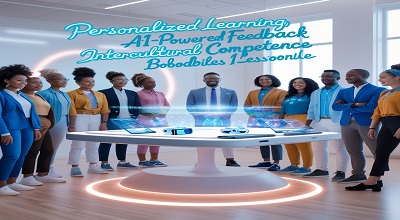Future-Ready Educators
Future-Ready Educators: The education landscape is evolving rapidly, driven by technological advancements, changing student needs, and global challenges. The Future-ready educators must adapt to these shifts by embracing innovative teaching methods, digital tools, and lifelong learning. In this blog post, we explore what it means to be a future-ready educator, provide real-world examples, and discuss the latest trends shaping education.
This comprehensive guide will cover:
- The definition of a future-ready educator
- Key skills and competencies needed
- Examples of future-ready educators in action
- Latest trends in education technology
- How institutions can support future-ready teaching
- FAQs on future-ready educators
What Is a Future-Ready Educator?
A future-ready educator is a teacher or instructor who leverages modern pedagogical approaches, digital tools, and adaptive strategies to prepare students for an unpredictable future. Unlike traditional educators, future-ready teachers focus on:
- Student-centered learning – Personalizing education based on individual needs.
- Technology integration – Using AI, VR, and online platforms to enhance learning.
- Lifelong learning – Continuously updating their own skills.
- Global collaboration – Connecting students with peers worldwide.
According to a report by the World Economic Forum (WEF), 65% of children entering primary school today will work in jobs that don’t yet exist. Future-ready educators play a crucial role in preparing them for this dynamic world.
Key Skills & Competencies for Future-Ready Educators
1. Digital Literacy & EdTech Proficiency
Future-ready educators must be comfortable with:
- Learning Management Systems (LMS) like Google Classroom, Moodle, or Canvas
- AI-powered tools (ChatGPT for lesson planning, Grammarly for feedback)
- Virtual Reality (VR) and Augmented Reality (AR) for immersive learning
2. Adaptive Teaching Methods
- Flipped Classrooms – Students learn theory at home via videos and engage in discussions in class.
- Project-Based Learning (PBL) – Students solve real-world problems collaboratively.
- Gamification – Using game elements (badges, leaderboards) to boost engagement.
3. Emotional Intelligence (EQ) & Social-Emotional Learning (SEL)
Teachers must foster resilience, empathy, and mental well-being in students.
4. Data-Driven Instruction
Using analytics to track student progress and adjust teaching strategies.
5. Global & Cultural Awareness
Preparing students for a multicultural workforce through global collaboration projects.
Examples of Future-Ready Educators in Action
1. Sal Khan (Khan Academy) – Personalized Learning
Khan Academy uses AI to provide tailored lessons, allowing students to learn at their own pace.
2. Esther Wojcicki – Blended Learning Advocate
A pioneer in combining traditional teaching with digital tools, Wojcicki emphasizes student journalism and media literacy.
3. Sugata Mitra – Self-Organized Learning Environments (SOLE)
Mitra’s “Hole in the Wall” experiment showed how children can teach themselves using the internet.
4. Jaime Casap – Google’s Education Evangelist
Promotes digital collaboration and project-based learning in schools.
5. Dr. Linda Darling-Hammond – Equity in Education
Focuses on policy changes to ensure all students have access to future-ready education.
Latest Trends Shaping Future-Ready Education
1. Artificial Intelligence (AI) in Education
- ChatGPT for tutoring
- AI-powered grading systems
2. Virtual & Augmented Reality (VR/AR)
- Medical students using VR for surgery simulations
- History lessons via AR reconstructions
3. Micro-Credentials & Digital Badges
Teachers and students earn certifications for specific skills (e.g., coding, digital marketing).
4. Blockchain for Secure Credentials
Prevents fraud in academic certifications.
5. Hybrid & HyFlex Learning Models
Combining in-person and online learning for flexibility.
How Schools & Institutions Can Support Future-Ready Educator?
- Professional Development Programs (e.g., Google for Education certifications)
- Investing in EdTech Infrastructure (smart classrooms, LMS platforms)
- Encouraging Teacher Innovation (hackathons, pilot programs)
- Building Global Partnerships (student exchange via digital platforms)
FAQs About Future-Ready Educators
1. What is the role of AI in future-ready education?
AI helps personalize learning, automate grading, and provide real-time feedback.
2. How can teachers improve digital literacy?
By taking online courses (Coursera, edX) and experimenting with EdTech tools.
3. What are the biggest challenges for future-ready educator?
Resistance to change, lack of funding, and keeping up with rapid tech advancements.
4. Can traditional teachers become future-ready?
Yes! Continuous learning and adapting new methods can transform any educator.
5. How do future-ready educators assess student success?
Through competency-based assessments, portfolios, and real-world project evaluations.
Conclusion
The future of education depends on teachers who embrace innovation, technology, and adaptability. By developing digital skills, fostering global collaboration, and using data-driven strategies, educators can prepare students for a rapidly changing world.
Free Link: Brutal Strike MOD APK
